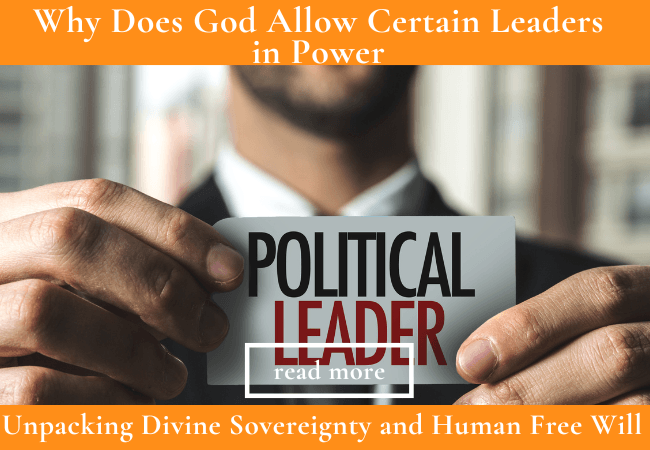
Examine the complex interplay of divine sovereignty and human free will in the context of leadership. Understand why God allows some leaders to rise to power and how this balance influences our personal empowerment and holistic development.
Why does God allow confident leaders to rise to power while others do not? This question has puzzled theologians, scholars, and ordinary people for centuries. It’s vital to understand this in a world were leadership shapes societies. As we face global changes, we may wonder about the divine hand in the leaders shaping our world. The recent rise of controversial leaders has only increased this curiosity. They are worldwide.
A Pew Research Center study found that 64% of adults worldwide believe a higher power is involved in human affairs, including the rise of leaders. In the U.S., about 50% believe God decides who leads the nation. These stats show many cultures strongly believe in divine control over leadership.
But what about human free will? In democracies, leaders are usually chosen by the people. This raises an intriguing question: How does divine sovereignty coexist with human choice? Their interplay tells a complex story. It speaks to faith, societal values, and personal empowerment. We will explore views that have been ignored on this topic. This will deepen our understanding of why some leaders are allowed to govern and what it means for us.
Divine Sovereignty and Human Free Will: A Complex Interplay
God’s Sovereignty:
Many believe God controls everything, including leaders’ rise and fall. From this view, God allows some leaders to rise to power for reasons we can’t understand. They may serve a larger divine plan, a ‘grand design’. Religious texts and teachings support this belief. They suggest that every leader, good or bad, has a role in this grand design.
Human Free Will:
At the same time, humans have free will and make choices, including the selection of leaders. In democracies, the people often choose leaders, reflecting society’s collective decisions. This duality raises questions about divine will and human agency. Can a leader’s rise to power be both a reflection of divine intent and human choice? This is where the conversation takes on a profound personal and spiritual nature.
Testing and Growth: The Purpose Behind Adversity
Testing Faith:
Some believe that God allows confident leaders to test faith and resilience. Brutal leaders challenge people to rely on their faith, grow in character, or stand up for what is right. This perspective sees leadership challenges as opportunities for spiritual and moral development.
Growth Through Adversity:
Adverse leadership can sometimes lead to societal or spiritual growth. Confident leaders’ challenges might foster community and renewed values. They could clarify justice and mercy. History has many examples. Societies faced with authoritarian leaders emerged more assertive and more united.
Consequences of Human Actions: Reaping What We Sow
Reaping What Is Sown:
The idea that societies reap what they sow is prominent in many religious traditions. If a society abandons its moral principles, poor leadership may result. It stresses the need for shared responsibility in a nation’s governance.
Opportunity for Reflection and Change:
Poor leadership can be a wake-up call. It urges societies to reflect on their values and governance and stresses the need for virtuous leaders. This reflection can spark major social and political reform and may push communities to seek better leaders in the future.
Mystery and Faith: Accepting What We Cannot Understand
Mystery of God’s Will:
Humans are not meant to understand all of God’s actions through reasoning. Some find the answer in accepting God’s will as a mystery. They trust that a greater good is at work, even if unclear. This acceptance is a cornerstone of faith for many believers.
Faith in God’s Plan:
God might call believers to trust His plan. It could involve the rise of some leaders for reasons known only to God. This faith demands patience and deep trust that, despite challenges, all will work for good.
Lessons for Future Generations: Learning from the Past
Historical Lessons:
The rise of confident leaders can serve as lessons for future generations. History learns from both good and bad leaders. It shapes the values and decisions of those who come after. By reflecting on past leadership, societies can understand what they value in leaders. They can then work to cultivate those traits in future generations.
5 Actionable Steps to Empower Your Life Amidst Challenging Leadership
- Deepen Your Faith:
Use challenging leadership as an opportunity to deepen your faith. Pray, meditate, or study spiritual texts. They should boost your trust in a higher plan. Strengthening your spiritual foundation can provide comfort and guidance during turbulent times.
- Strengthen Community Bonds:
Adversity often brings people together. Seek to build stronger connections within your community. Support one another. Share resources. Work together to tackle leadership challenges that may clash with your values.
- Advocate for Change:
Be proactive in advocating for the values you believe in. Your voice matters. Vote, join peaceful protests, or discuss in your community. Use it to promote justice, compassion, and integrity in leadership.
- Reflect on Personal Values:
Reflect on your values and how they align with the current leadership. This reflection can guide your actions and help you stay true to your principles in tough times.
- Educate and Inspire Others:
Share your knowledge and insights with others. Use social media, writing, or talks to educate others. Highlight the need for virtuous leadership. Inspire them to take positive action.
Bonus Actionable Step: The Power of Your Vote
Exercise Your Right to Vote:
Your vote is not a civic duty—it’s a powerful tool for self-discovery and empowerment. Voting allows you to express your values, beliefs, and vision for the future. It has a direct influence on the leadership that shapes your world. It aligns with your principles and ideals. Voting is a way to support the leadership you believe in. It is also a chance to take part in democracy. Voting is part of your journey to personal empowerment. It affirms that your voice matters and that you can shape the future.
Each time you vote, you affirm your commitment to living by your beliefs. Your vote reflects who you are and what you stand for. Voting in elections helps the common good and gives you the power to change the world positively.
Remember, your vote is vital in your journey of self-discovery and empowerment. Don’t underestimate your impact—make your voice heard and let it resonate in the corridors of power.
Some people feel that voting doesn’t work for distinct reasons, often influenced by individual experiences, historical events, and societal trends.
Here are a few common reasons people might think voting isn’t practical:
- Perceived Lack of Change: Some feel that elected officials must significantly improve their lives or communities regardless of party. When policies and promises seem disconnected from real progress, this creates a sense of disillusionment.
- Distrust in the System: Stories of election interference, gerrymandering, and the influence of big money in politics lead some to believe that the system is manipulated and that individual votes don’t hold much weight against more extensive interests.
- Complexity and Confusion: The voting system can feel overly complex, especially with the electoral college in the U.S. or parliamentary structures elsewhere. For some, this complexity can create a belief that their single vote doesn’t impact the more extensive process.
- Voter Suppression and Accessibility Issues: In areas where voting is made difficult due to limited polling places, ID requirements, or restrictive laws, people may feel discouraged, believing these barriers are designed to keep certain groups from being heard.
- Influence of Negative Narratives: Social media and media coverage can amplify cynicism by focusing on sensational or polarizing stories that make the political process seem corrupt or ineffective, reinforcing skepticism about the value of voting.
While these beliefs contribute to low voter turnout or disengagement, voting can directly impact community issues and policies, especially in local elections.
Conclusion:
Understanding why God allows confident leaders to rise to power is a complex, spiritual quest. It involves struggling with divine power, free will, and their strange interaction. While the reasons may not always be clear, the impact of leadership on our lives is undeniable. We can face these challenges with resilience and grace. We must deepen our faith and values and strengthen our communities.
As you ponder these thoughts, I encourage you to act in your own life. How can you use the current leadership landscape to empower yourself and inspire others? Visit my store at jamielondonclay.com. It has products for your growth and empowerment. I earn a commission on purchases made through my blog’s affiliate links. It helps keep this community thriving and growing.
I invite you to subscribe to my blog, follow me on social media, and share this article with your network. Your engagement keeps this community alive. Let’s explore more similar topics. They should focus on living with more freedom and authenticity.
I am starting a YouTube channel focused on personal and spiritual growth. Please be patient as I roll out content there and on my blog. Will you join me on this journey of whole-personal development?
